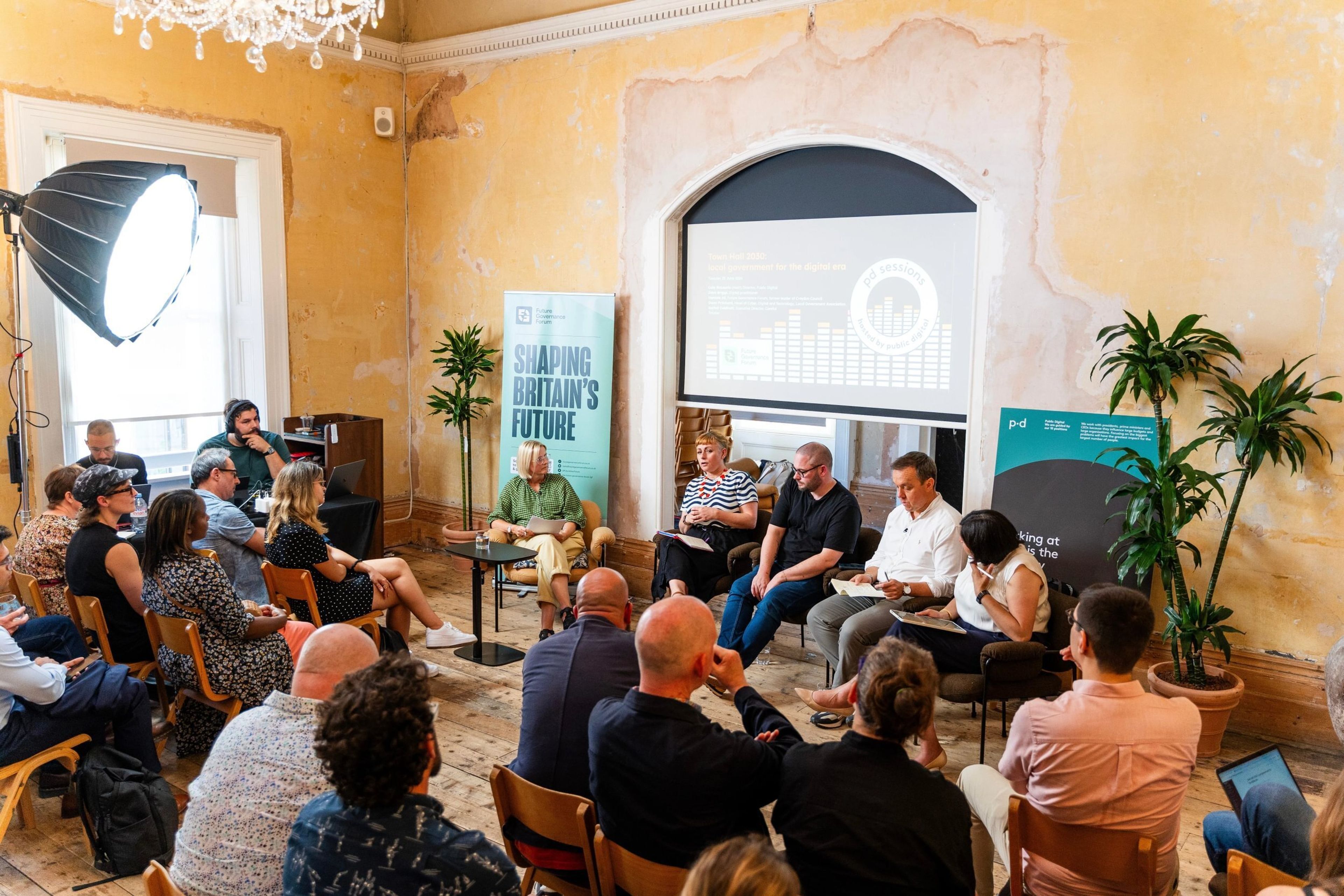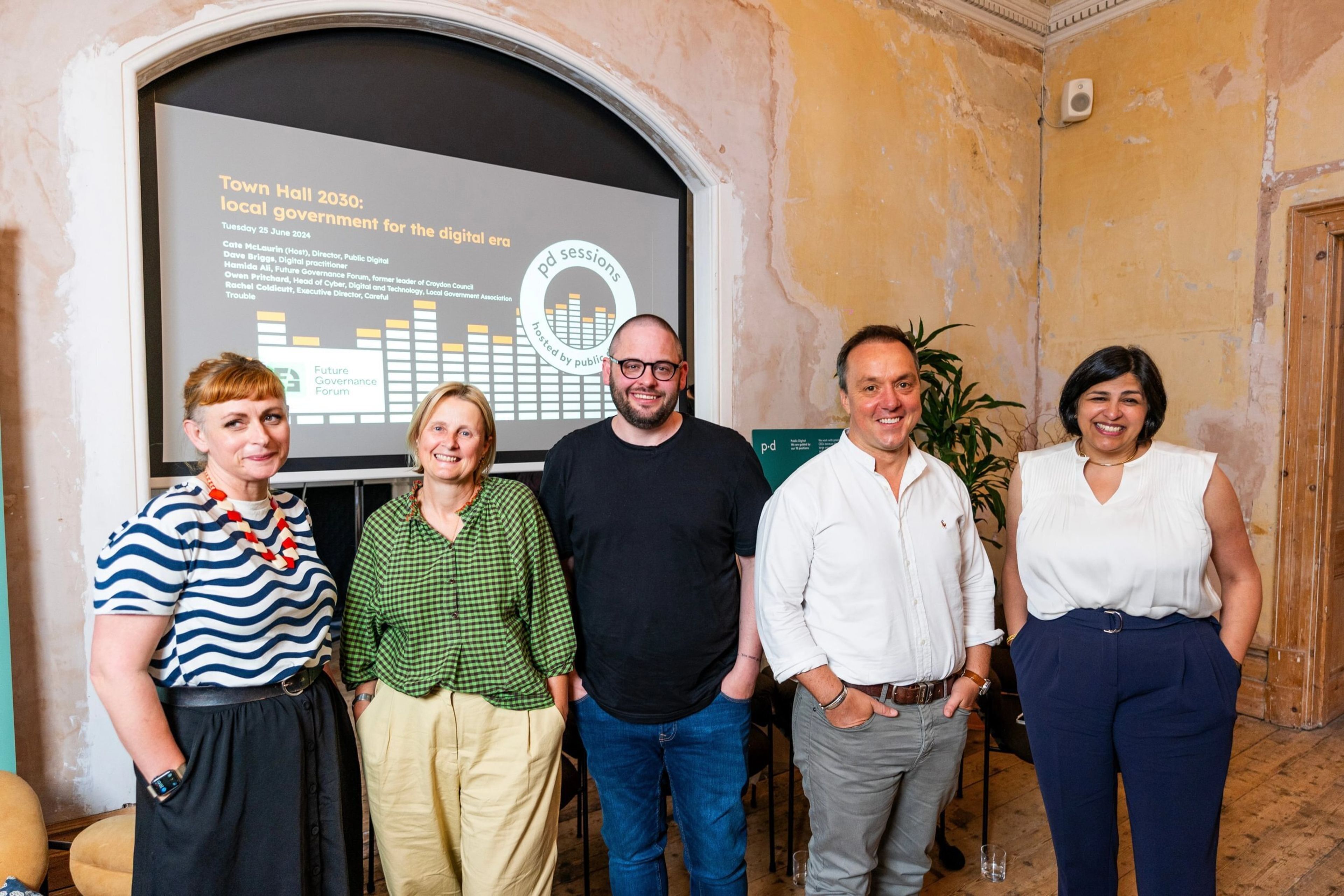Town Hall 2030 - the role of digital in enabling place-based, public service delivery
Guest written by Robbie Bates, Design and Strategy Consultant
Town Hall 2030 is an exploratory research project being led by The Future Governance Forum (FGF) in partnership with Camden Council and Public Digital. Over the coming months we’ll be exploring: What role digital and data should play in supporting place-based, local public service delivery and reform?
To kick the work off we hosted a panel discussion with Rachel Coldicutt (Careful Trouble), Dave Briggs (independent digital practitioner), Hamida Ali (Future Governance Forum) and Owen Pritchard (LGA). The event brought together people from across the sector to start answering that question; and importantly discuss why, after so much work and willing, are we still grappling with many of the same questions that we had a decade ago?

This event is the start of a conversation and we’ve highlighted 6 reflections from the evening. You can also rewatch the full event here.
Here are our 6 reflections:
1: Fixing a fundamentally broken software market
As Rachel Coldicutt raised during the evening (and echoed by Paul Maltby in the Q&A), we are working with and responding to a fundamentally broken software market. We can talk about how we might better collect, use and connect data to shift towards more preventative public service delivery; but there is a big elephant in the room. That is a software market that a) is selling the wrong things and b) holds far too much power through proprietary solutions that only meet partial needs (if at all) of the sector and the communities it serves.
2: Shifting the sector from competition to collaboration
In response to a broken software market, we absolutely need to act collectively and collaboratively as a sector. Thinking about how we can use the sector’s collective buying power and political influence to shape the market that we need, rather than being led by it. During the evening we spoke about ideas of ‘collective risk sharing’ and opportunities for parts of the sector to group together to develop sector-owned solutions that can address common problems.
This will require a sector-wide, cultural shift from ‘competition’ towards ‘collaboration’. Something that should be supported by the centre through shifting policy and budgeting processes away from things like competitive funding.
3: Enabling greater orchestration across the whole system
Collaboration and a sector that learns and adapts with and from each other was a big part of the discussion. However it was recognised that we can’t just leave this type of sector wide collaboration to happen organically. As Hamida Ali puts it we need intentional ‘orchestration’ to be happening across the sector. We need ways to harness the talent and capacity within the sector, and direct it in ways that the whole sector can benefit from - not just those that have the money and funding.
This idea of better orchestration also applies to how we connect and share learning more intentionally. How do we build a more robust learning infrastructure across the entire sector, and what is the continued role of organisations like the LGA in supporting and enabling it (and intervening where needed).
During the panel discussion Dave Briggs raised ideas around how we get more mature in identifying common problems across the sector (regardless of type or size of council, demographics of a place etc.); and develop replicable solutions, so that organisations stop individually developing similar solutions to the same problems.
4: Moving away from a centralist mindset
This idea of solving common problems and sharing them is good in practice, but we need to be really careful that this doesn’t just result in more ‘centralisation’ - under a different guise. We need to be clear about what should be owned ‘centrally’ and what should be driven more locally. For example, we don’t simply want to replicate a ‘GDS model’ locally. One area that could be helpful here, and to be owned ‘centrally’ is the development of standards, as Rachel raised. Continuing to build on the work of places like MHCLG to develop and embed local government specific standards used to guide and support decisions around technology and data.
5: ‘Keeping the lights on whilst we rewire the house’
Ideas to address some of these sector wide issues were welcomed and needed, but as Rachel put it ‘we need to keep the lights on whilst we rewire the house’. As Hamida illustrated through her experience as leader of Croydon Council, the sector is working under extremely difficult and precarious financial conditions, and has little bandwidth to think about longer-term sector wide change or reform (despite being desperate to see it).
Discussion looked toward how we might develop new ideas or solutions that could benefit the sector, without disrupting the whole system as it continues to keep statutory and critical services running. Ideas looked at how we might ‘twin track’ how we develop solutions and take a sandbox approach to local government innovation (similar to some of Eddie Copeland’s thoughts from LOTI).
6: Moving digital beyond the ‘things we build’ towards the ‘way we work’
Lastly, we need a much closer relationship and distance between DDaT (Digital, Data and Technology) professions and those in services and corporate functions. We need to stop seeing ‘digital’ as ‘IT’, and take a much broader view, helping leaders and colleagues who deliver services see it as a part of how we work and how services are delivered.
There was a clear absence and representation in the room of our wider public sector colleagues. Colleagues from services or finance, who we absolutely need in the room if we want some of the things we talked about to change. As a sector we need to continue to remove barriers (and language) around ‘digital’ and help organisations to focus much more on ‘how we work’ rather than on ‘what gets built’. How do we bring together people with the right skills and expertise around the right problems, regardless of profession, practice or organisational silos? Equipping them with the right data, supporting them to deliver shared outcomes and drive sector wide reform in the process.

As we hit publish on this blog we are now on the other side of a general election and a new government. We’re starting to see some of the early signs of change and signals of intent from the centre including returning to MHCLG (Ministry of Housing, Communities & Local Government) and bringing GDS (Government Digital Service), CDDO (Central Data & Digital Office) and the Incubator for AI into DSIT (Department for Science, Innovation & Technology).
These early changes feel promising, but the coming weeks and months will be critical in setting a new direction for local government and the reform that the sector is in desperate need for. Through Town Hall 2030, we hope to create some space and a platform to bring together ideas for change across the sector.
Over the next few months we’ll be continuing the conversation through other events and roundtables. Keep an eye on The Future Governance Forum’s Twitter and LinkedIn for updates as the work develops.